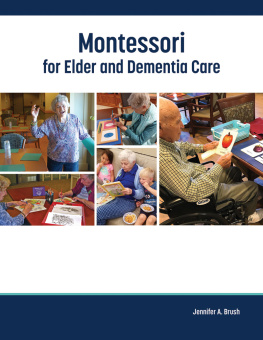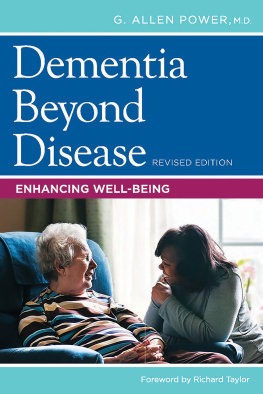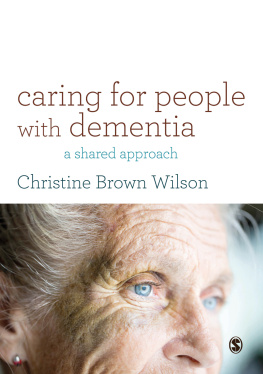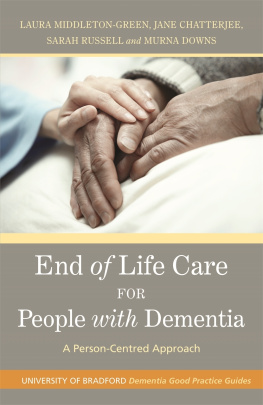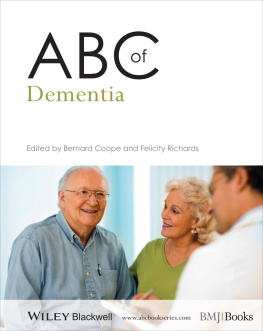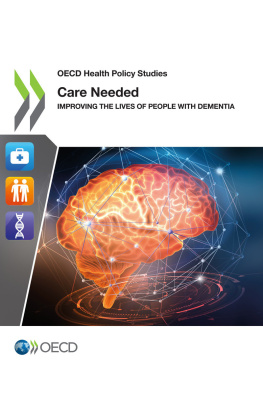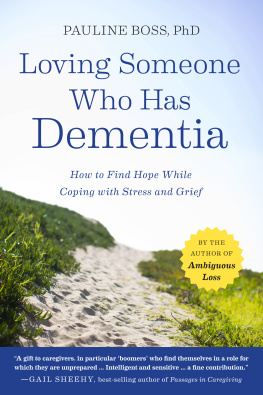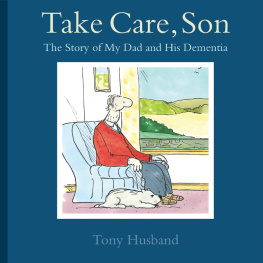Laura Wayman - A Loving Approach to Dementia Care
Here you can read online Laura Wayman - A Loving Approach to Dementia Care full text of the book (entire story) in english for free. Download pdf and epub, get meaning, cover and reviews about this ebook. year: 2021, publisher: Johns Hopkins University Press, genre: Home and family. Description of the work, (preface) as well as reviews are available. Best literature library LitArk.com created for fans of good reading and offers a wide selection of genres:
Romance novel
Science fiction
Adventure
Detective
Science
History
Home and family
Prose
Art
Politics
Computer
Non-fiction
Religion
Business
Children
Humor
Choose a favorite category and find really read worthwhile books. Enjoy immersion in the world of imagination, feel the emotions of the characters or learn something new for yourself, make an fascinating discovery.

- Book:A Loving Approach to Dementia Care
- Author:
- Publisher:Johns Hopkins University Press
- Genre:
- Year:2021
- Rating:5 / 5
- Favourites:Add to favourites
- Your mark:
- 100
- 1
- 2
- 3
- 4
- 5
A Loving Approach to Dementia Care: summary, description and annotation
We offer to read an annotation, description, summary or preface (depends on what the author of the book "A Loving Approach to Dementia Care" wrote himself). If you haven't found the necessary information about the book — write in the comments, we will try to find it.
A Loving Approach to Dementia Care — read online for free the complete book (whole text) full work
Below is the text of the book, divided by pages. System saving the place of the last page read, allows you to conveniently read the book "A Loving Approach to Dementia Care" online for free, without having to search again every time where you left off. Put a bookmark, and you can go to the page where you finished reading at any time.
Font size:
Interval:
Bookmark:
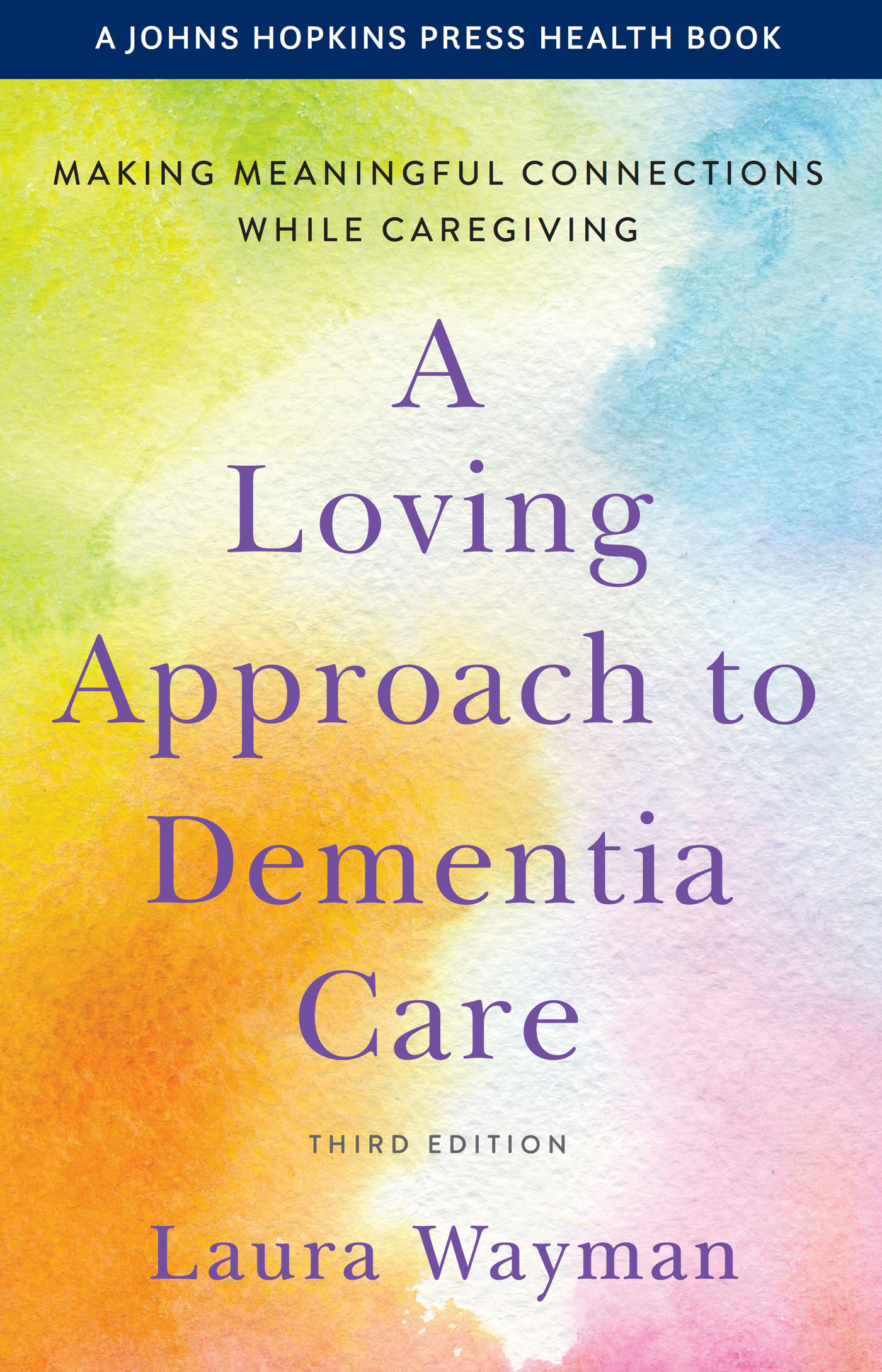
A Loving Approach to Dementia Care
A Johns Hopkins Press Health Book
THIRD EDITION
MAKING MEANINGFUL CONNECTIONS WHILE CAREGIVING
Laura Wayman

Johns Hopkins University Press
Baltimore
Note to the Reader: This book is not meant to substitute for medical care and treatment should not be based solely on its contents. Instead, treatment must be developed in a dialogue between the individual and his or her physician. The book has been written to help with that dialogue.
Drug dosage: The author and publisher have made reasonable efforts to determine that the selection of drugs discussed in this text conform to the practices of the general medical community. The medications described do not necessarily have specific approval by the US Food and Drug Administration for use in the diseases for which they are recommended. In view of ongoing research, changes in governmental regulation, and the constant flow of information relating to drug therapy and drug reactions, the reader is urged to check the package insert of each drug for any changes in indications and dosage and for warnings and precautions. This is particularly important when the recommended agent is a new and/or infrequently used drug.
2021 Johns Hopkins University Press
All rights reserved. Published 2021
Printed in the United States of America on acid-free paper
2 4 6 8 9 7 5 3 1
Johns Hopkins University Press
2715 North Charles Street
Baltimore, Maryland 21218-4363
www.press.jhu.edu
Library of Congress Cataloging-in-Publication Data
Names: Wayman, Laura, 1955 author.
Title: A loving approach to dementia care : making meaningful connections while caregiving / Laura Wayman.
Description: Third edition. | Baltimore : Johns Hopkins University Press, 2021. | Series: A Johns Hopkins Press health book | Includes bibliographical references and index.
Identifiers: LCCN 2020013527 | ISBN 9781421440071 (paperback) | ISBN 9781421440071 (ebook)
Subjects: LCSH: DementiaPatientsCarePopular works. | Alzheimers diseasePatientsCarePopular works.
Classification: LCC RC521 .W39 2021 | DDC 616.8/31dc23 LC record available at https://lccn.loc.gov/2020013527
A catalog record for this book is available from the British Library.
Special discounts are available for bulk purchases of this book. For more information, please contact Special Sales at .
Johns Hopkins University Press uses environmentally friendly book materials, including recycled text paper that is composed of at least 30 percent post-consumer waste, whenever possible.
With Alicia Murray
With Alicia Murray
With Alicia Murray
With Alicia Murray
With Denise Howard
I thank my dear husband, Stephen Wayman, for his patience and support (Boy, has he had a lot of it!). He has steadfastly continued to be my pillar of light, my fountain of love, and a constant source of comfort along the second leg, and now third leg of this amazing journey.
To my daughter Alicia, for her contributions as a supporting author and encourager. To my daughter Angie, who was always the long-distance promoter, silently cheering me on from afar. And to all of my family, who have been there for me all along the way.
To those who have continued to support me through the long birthing process (including this third time around!): DanaLyn Brophy, Teri Crocker, Pamela Dallas, Joe Dunham, Dr. Barbara Gillogly, Cindy Gustafson, Jocelyn Kaufenberg, Rob Stewart, and Andrea Campisi, Jay Zimmer, Caroline Allen, Eric Stone, Audra DAgostino, Gillian Isaacs-George, Sophie Slater, Rachel VanDyke, Clark Wright, Tammy Cahill, Melinda Klick, Maria Xarias, Katie Wayman, Theresa Haleen, Carol Allen, Mayor John Goodwin, Blake and Candace Ellington, as well as my many other dementia-aware champions too numerous to fit on this page. I could not raise dementia awareness worldwide without you.
A very special thanks to Denise Howard, whose expert editing and copywriting made this third edition of the book once again flow and come together with beauty and grace. Her kind words, professionalism, and conviction gave me the strength to make it to this third finish line. She is my dear friend who held my hand and whispered the necessary nurturing encouragement and constructive advice.
I want to express my heartfelt appreciation for the warm and supportive response I have received as a new, as well as a now third edition, author from everyone at Johns Hopkins University Press in readying my work to be presented to the world. From day one, getting communication and guidance from executive editor Jacqueline Wehmueller for the first and second edition, and now for this third go-round, from Joe Rusko and Adelene Jane Medrano, has been an overall positive experience way beyond what thank you can express. And the entire JHUP team has worked, and continues to work, tirelessly with me, all the while presenting profound consideration, understanding, and professional commitment. Truly you all are a shining example of the gold standard in customer service, showing Johns Hopkins University Press as the leader and innovator in scholarly publishing worldwide.
To all the caregivers who honored me with their stories, struggles, strength, moments of success, and commitment.
And a very sincere thank-you to the countless people who initiated this whole project by asking me, Do you have a book? (and more recently by the question, When can we read your third edition?).
This book is dedicated to the loving memory of my mother.
A Loving Approach to Dementia Care
Introduction
Navigating the Journey

Caring for a person who has dementia is a labor of devotion and patience. Sadly, many caregivers selflessly sacrifice their own well-being during the process. In addition, many caregivers, whether they are lay caregivers looking after a loved one at home or professionals working in a clinical setting, do not have the knowledge or training they need to meet the challenges of dementia. That is exactly where successful caregiving breaks down.
Providing care is an important and noble endeavor, but to be able to provide the best possible care, you must also take care of yourself. So pause here and ask yourself one simple question: would it be okay with you, the caregiver, if you experienced a lasting sense of relief?
I have asked many caregivers this question.
Not surprisingly, not one has answered No.
If you are caring for someone with a form of dementia (such as Alzheimer disease) or another cognitive impairment, this book is intended to help lighten your load every day. It is possible to simultaneously provide better care for the person with dementia and for yourself.
Of course, every family and situation is different. You may have been thrust into this caregiving role unexpectedlywithout any training or even any encouragement. Perhaps the care is being provided at home, with or without other family or professional in-home support. Or maybe the care is provided in a specialized memory care unit, an assisted living environment, or a skilled nursing facility. Although caregiving is often inspiring and rewarding, it can be very difficult. Caring for someone with a cognitive impairment can be even more difficult than caring for someone with a physical impairment who is fully competent mentally and emotionally. The complications of confusion, forgetfulness, and memory loss, and the behaviors that go along with them, can be traumatic for the person with the disease and for the person providing care. Because of the dementia, neither the persons involved nor the relationship will ever be the same.
Font size:
Interval:
Bookmark:
Similar books «A Loving Approach to Dementia Care»
Look at similar books to A Loving Approach to Dementia Care. We have selected literature similar in name and meaning in the hope of providing readers with more options to find new, interesting, not yet read works.
Discussion, reviews of the book A Loving Approach to Dementia Care and just readers' own opinions. Leave your comments, write what you think about the work, its meaning or the main characters. Specify what exactly you liked and what you didn't like, and why you think so.


